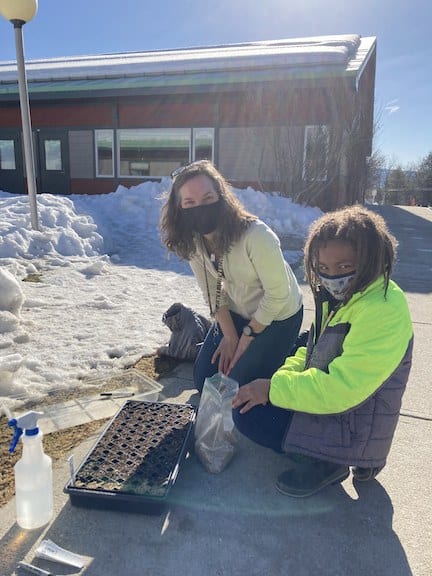
LONDONDERRY, Vt. – At Flood Brook School a tea party is nothing short of transformational. “I feel the tea moving to the ends of my fingers and toes,” says a student, sipping a freshly steeped chamomile. “My circulation must be good.”
At a time when nearly all children spend their school days nose-to-screen, the Flood Brook School has brought an ancient tradition into the curricula as a way to encourage hands-on instruction and mindfulness to science.
It all began last January when the Vermont Agency of Education circulated a weekly news update to educators announcing a number of new school guidelines, essay contests, events, and courses. Buried near the bottom of the list was an intriguing entry: “The Tea Project: Designing, Planting and Caring for a Perennial Tea Garden.” The professional development course was run by Castleton University, under the direction of herbalist, Angie Barger. The curriculum was created for “educators who are passionate about bringing nature, biology, routines for empowerment, and social emotional learning into the daily classroom routine.”
The Tea Project caught the attention of FBS administrative assistant, Ann Alford, who circulated the AOE offering to staff in a school email. Flood Brook already takes great advantage of its gorgeous outdoor surroundings, all 22 acres. Alford’s note caught the attention of faculty members Sonja Thorley, instructional coach; Carinthia Grayson, middle school science; Jennifer Cox, special education and; Rebecca Scott, clinician. Soon they were signed up to bring the Tea Project to FBS.
“At first, we all loved the idea of using tea and the outdoors as an alternative approach to learning,” says Thorley. “But we all knew that success would depend on the kids. Turns out the kids just love it.”
The Tea Project works on multiple fronts. It began with groups of students planting herbal tea seeds in trays of small plastic pots in early March. The students and the adults have been keeping a watchful eye and a full water can at the ready. Their seeds are responding by sprouting like crazy. There are several kinds of tea including lemon balm, mountain mint, sage, and echinacea.
By the end of May, the seedlings will be ready to plant into a designated garden spot in a courtyard outside the cafeteria and a second location above the playing fields. When the students return in the fall, they will harvest some edibles that have been planted with the herbs, but will probably need to wait another year for the plants to fully mature so they can be dried and be ready for drinking. Another life lesson from the project: tea rewards patience.
“The kids are clearly immersed in the growing process,” Grayson says. “They monitor the plants periodically and pinch the leaves to identify the herb by its aroma. Lemon balm is a special favorite. The whole process fits neatly into our teaching of the biological life cycles of plants.”
While the students are working on the first growing season for the Flood Brook Tea Project, they already have been introduced to the fact that tea is far more than a beverage. It’s not just the what, but the how one drinks it that makes tea such a satisfying interlude.
After returning from recess, for example, the students in Grayson’s science class prepare their tea and sit down as a group, with plenty of time built in to sip and swallow. Tea is not to be gulped, but savored. While they enjoy the tea, they may listen to stories or can choose not to talk, but to stay silent and appreciate how the tea feels to help relax them. As an important part of the Tea Project, students are also guided in an intentional mindfulness practice of deep breathing, tea sipping, and noticing how the tea feels in their bodies; paying attention, on purpose, to the present moment.
“The children are learning the calming effect of drinking tea in a mindful manner,” says FBS Clinician Scott. “It relieves stress, anxiety, restlessness. It must be working, one question I hear constantly from students of all grades is, ‘Are we having tea today?’”